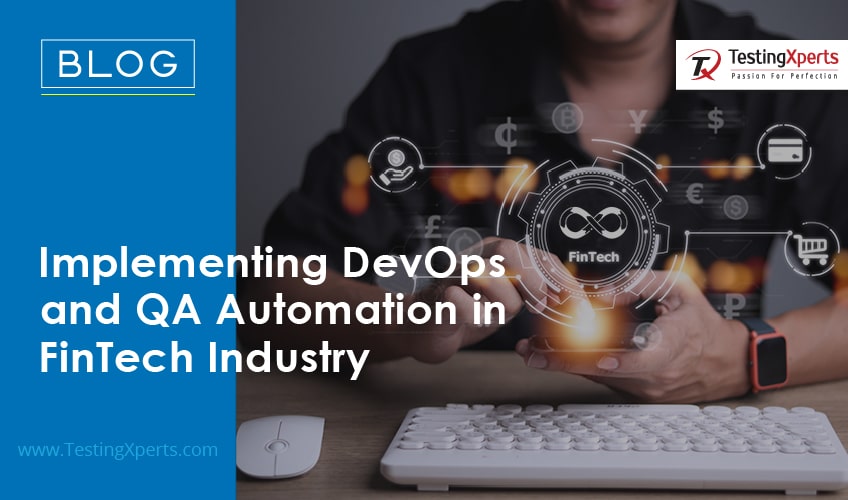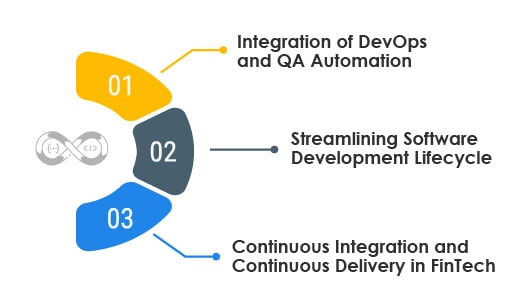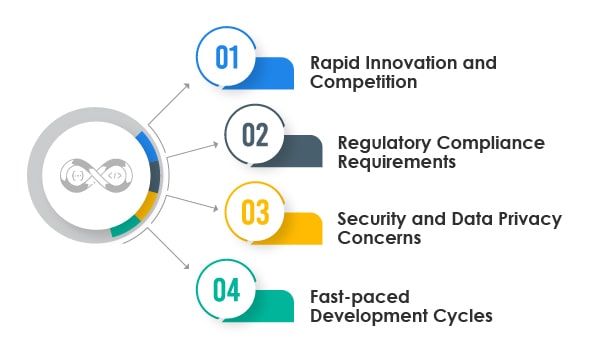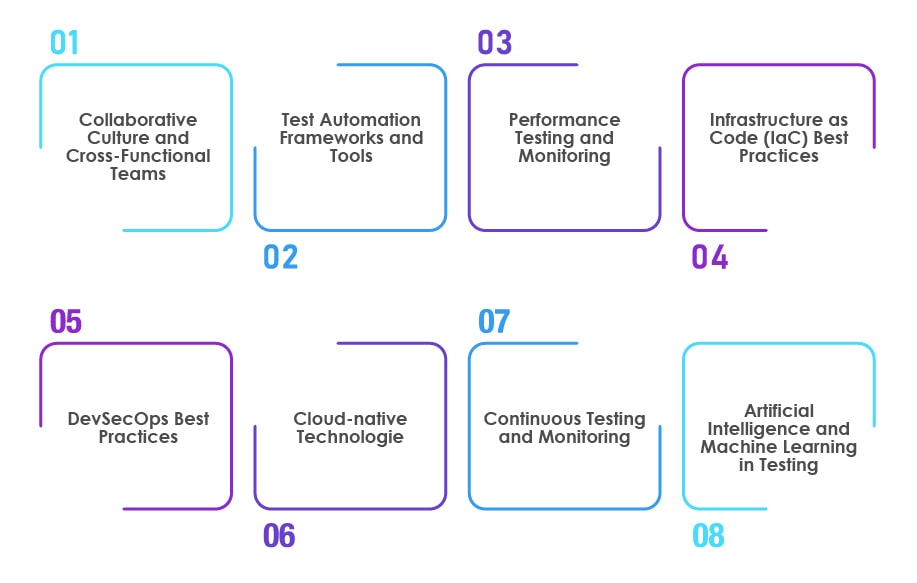Recommended Blogs
Implementing DevOps and QA Automation in FinTech Industry

- Understanding DevOps and QA Automation in FinTech
- Integrating DevOps and QA Automation into FinTech
- Addressing Challenges in the FinTech Industry
- Best Practices for Implementing DevOps and QA Automation
- Conclusion
- How Can TestingXperts Help with DevOps and QA Automation in FinTech?
The FinTech industry has witnessed remarkable growth in recent years, revolutionizing how financial services are delivered. With its focus on innovation, efficiency, and customer-centricity, the sector constantly faces evolving challenges. Thus, it makes DevOps and QA automation increasingly critical in this dynamic landscape.
Hence, it is no surprise that 91% of financial institutions have embraced this methodology. At first glance, it may appear that the task is complete. However, according to Gartner’s projections for 2023, approximately 75% of DevOps industry initiatives, including those in the Fintech sector, are expected to be partially implemented or completed.
Understanding DevOps and QA Automation in FinTech
DevOps is a collaborative approach emphasising integration, automation, and communication between development and operations teams. In the FinTech industry, DevOps play a vital role in addressing challenges and driving innovation.
QA automation empowers FinTech companies to streamline their development and testing processes, enabling them to deliver cutting-edge products and services to their customers quickly, accurately, and confidently. The role of QA automation in FinTech goes beyond mere quality control. It serves as a strategic enabler for success in a highly competitive and rapidly evolving industry.
Following are some key points that can help you understand the role of DevOps and QA automation in FinTech:
• DevOps QA promotes the principles of continuous integration, continuous delivery, and continuous deployment (CI/CD). By breaking down silos and fostering collaboration, DevOps enables faster and more reliable software releases.
• Quality Assurance (QA) is crucial in the FinTech industry to ensure that software solutions meet the highest reliability, security, and compliance standards. QA helps mitigate risks, improves customer experience, and enhances brand reputation.
• Implementing DevOps in the FinTech industry brings numerous advantages, including accelerated time to market, improved software quality, enhanced collaboration, and better customer satisfaction.
• Manual processes are prone to human errors, inefficient, and time-consuming, so QA automation is necessary to cope with the growing complexities of FinTech applications.
• Many tools and technologies support the DevOps ecosystem, enabling seamless integration, automated testing, and efficient deployment. For example, Jenkins, Docker, Kubernetes, and Ansible.
• QA automation enables FinTech organisations to achieve faster and more reliable testing, reduced time-to-market, enhanced test coverage, improved scalability, and increased efficiency. Automation tools like Selenium, Appium, and JMeter offer robust testing capabilities.
Integrating DevOps and QA Automation into FinTech

Integrating DevOps and QA automation in the FinTech industry brings significant benefits. It streamlines the software development lifecycle, enables continuous testing and feedback, and facilitates rapid and reliable software delivery. Integrating DevOps and QA automation enhances efficiency and helps FinTech organizations stay competitive in a fast-paced market. Following are some key benefits that DevOps and QA automation could bring to the FinTech industry:
Integration of DevOps and QA Automation:
DevOps and QA automation complement each other by automating the testing process and integrating it seamlessly into the software development lifecycle. This integration allows continuous testing, rapid feedback, and quick bug resolution.
Streamlining Software Development Lifecycle:
DevOps practices and QA automation simplify the software development lifecycle, reducing bottlenecks, eliminating manual handovers, and improving overall efficiency. This leads to faster delivery of high-quality software solutions.
Continuous Integration and Continuous Delivery in FinTech:
CI/CD practices enabled by DevOps and QA automation promote constant integration of code changes, automated testing, and continuous delivery of software, allowing FinTech organisations to deliver features and updates rapidly and reliably.
Addressing Challenges in the FinTech Industry

The FinTech industry faces many challenges that demand constant attention and adaptation. One of the major hurdles is the rapid pace of innovation and competition, which drives the need for continuous improvement and cutting-edge solutions. Balancing the delivery of high-quality software while maintaining a competitive edge is a challenging feat. Following are some of the challenges faced by the FinTech industry:
Rapid Innovation and Competition:
The FinTech industry operates in a highly competitive environment driven by the need for constant innovation. This demand for speed and agility challenges delivering high-quality software solutions while maintaining a competitive edge.
Regulatory Compliance Requirements:
Stringent regulatory frameworks govern the FinTech industry to ensure data security, privacy, and transparency. Compliance with these regulations is crucial, adding complexity to software development processes and testing.
Security and Data Privacy Concerns:
The FinTech sector deals with sensitive financial data, prioritising security and data privacy. Robust testing measures are necessary to identify vulnerabilities and safeguard against potential breaches.
Fast-paced Development Cycles:
FinTech organisations often operate on short development cycles to meet market demands and stay ahead of the competition. This accelerated pace necessitates efficient testing methodologies to ensure quick and reliable releases.
Best Practices for Implementing DevOps and QA Automation

Implementing DevOps and QA automation in the FinTech industry requires a strategic approach and adherence to best practices. By following these guidelines, organizations can maximize the benefits of this integration and ensure a seamless and efficient software development and testing process:
Collaborative Culture and Cross-Functional Teams:
Encourage a culture of collaboration, communication, and knowledge-sharing between development, operations, and QA teams. Cross-functional teams facilitate a smooth flow of information and foster a DevOps mindset.
Test Automation Frameworks and Tools:
Adopting robust test automation frameworks and tools is essential for efficient and effective QA automation. Choose frameworks that align with the unique requirements of the FinTech industry and leverage tools that provide comprehensive testing capabilities.
Performance Testing and Monitoring:
Implement performance testing to ensure software solutions can handle the expected load and perform optimally under various scenarios. Monitor applications in production to identify performance issues and proactively address them.
Infrastructure as Code (IaC) Best Practices:
Leverage Infrastructure as Code (IaC) practices to automate the provisioning, configuration, and management of infrastructure resources. IaC enables consistency, scalability, and traceability of infrastructure changes.
DevSecOps Best Practices:
Integrating security practices into DevOps, known as DevSecOps, is gaining momentum in FinTech. With the increasing focus on data security and privacy, embedding security measures throughout the software development lifecycle becomes crucial. DevSecOps promotes continuous security testing, vulnerability scanning, and automated compliance checks to ensure robust protection against cyber threats.
Cloud-native Technologies:
As FinTech companies embrace the cloud, cloud-native technologies are becoming essential. Containers, microservices, and serverless architectures enable greater scalability, flexibility, and agility in software development and deployment. QA automation can seamlessly integrate with cloud-native technologies, facilitating faster testing cycles and more efficient resource utilization.
Continuous Testing and Monitoring:
Continuous testing and monitoring are integral to DevOps and QA automation. With the rise of CI/CD pipelines, automated tests can be triggered at various stages, providing instant feedback on code changes and ensuring software stability and reliability. Real-time monitoring of production systems helps identify performance bottlenecks and proactively address issues.
Artificial Intelligence and Machine Learning in Testing:
AI and ML transform how software is tested in the FinTech sector. By leveraging these technologies, QA automation can intelligently generate test cases, analyze vast amounts of data, and identify patterns and anomalies, leading to more accurate and efficient testing processes.
Conclusion
The FinTech industry thrives on innovation, speed, and reliability. Now the question is, DevOps or QA, which is better? DevOps and QA automation are indispensable in meeting these demands. By integrating DevOps principles and implementing QA automation, FinTech organisations can streamline their software development processes, deliver high-quality solutions faster, and gain a competitive edge. Embracing these practices will drive efficiency, improve collaboration, and ensure the industry’s continued success.
Key Takeaways and Recommendations for FinTech Organizations:
• Adopt DevOps and QA automation to drive innovation, efficiency, and reliability.
• Establish a collaborative culture and foster cross-functional teams.
• Invest in robust test automation frameworks and tools tailored to the FinTech industry.
• Prioritise performance testing and monitoring to ensure optimal application performance.
• Implement IaC and DevSecOps best practices for infrastructure and security.
• Stay abreast of emerging technologies and adapt to industry trends.
• Foster a continuous learning and skill development culture for DevOps and QA professionals.
How Can TestingXperts Help with DevOps and QA Automation in FinTech?
At TestingXperts, we specialize in providing comprehensive DevOps testing and QA automation solutions tailored to the unique needs of the FinTech industry. Our expert teams leverage cutting-edge tools, frameworks, and methodologies to streamline software development processes, enhance testing efficiency, and ensure the delivery of high-quality FinTech automation solutions. With our deep industry expertise and focus on customer satisfaction, we are committed to supporting FinTech organizations in achieving their innovation, reliability, and customer-centricity goals. Following are some of the reasons that justify why to partner with TestingXpert.
Expertise in FinTech Domain:
TestingXperts has extensive experience working in the FinTech industry, understanding its unique challenges and regulatory requirements. Our team of domain experts brings a deep understanding of financial systems, ensuring accurate and comprehensive testing of your critical applications.
Cutting-Edge Automation Frameworks:
We leverage the latest tools and technologies to design and implement QA automation frameworks tailored to the needs of FinTech organisations. Our AI and machine learning expertise enables us to build intelligent test automation solutions that enhance efficiency and accuracy in your testing processes.
Integrated DevOps and QA Automation Approach:
We emphasis integrating DevOps practices and QA automation to streamline your software development lifecycle. Our experts will help you implement a seamless workflow, enabling continuous testing, rapid feedback, and efficient bug resolution. This approach ensures faster delivery of high-quality software solutions while maintaining a competitive edge.
Compliance and Security Focus:
We recognise the critical importance of data security, privacy, and regulatory compliance in the FinTech industry. Our experts are well-versed in the stringent standards and frameworks governing the sector. We ensure your applications meet compliance requirements, protecting sensitive financial data and mitigating risks.
End-to-End Testing Services:
We offer a comprehensive suite of testing services covering functional, performance, security, and compatibility testing, among others. Our skilled team follows industry best practices and employs various testing techniques to identify defects early in the development cycle, saving time and resources.
Contact TestingXperts today to learn how we can assist your organization in implementing DevOps and QA automation for the FinTech industry.
Discover more
